Related Research Articles

In music, a single is a type of release of a song recording of fewer tracks than an album or LP record, typically one or two tracks. A single can be released for sale to the public in a variety of physical or digital formats. Singles may be standalone tracks or connected to an artist's album, and in the latter case would often have at least one single release before the album itself, called lead singles.

An extended play (EP) is a musical recording that contains more tracks than a single but fewer than an album or LP record. Contemporary EPs generally contain up to eight tracks and have a playing time of 15 to 30 minutes. An "EP" is usually less cohesive than an album and more "non-committal".
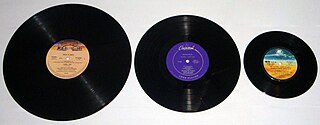
A phonograph record, a vinyl record, or simply a record or vinyl is an analog sound storage medium in the form of a flat disc with an inscribed, modulated spiral groove. The groove usually starts near the outside edge and ends near the center of the disc. The stored sound information is made audible by playing the record on a phonograph.

The twelve-inch single is a type of vinyl gramophone record that has wider groove spacing and shorter playing time with a "single" or a few related sound tracks on each surface, compared to LPs which have several songs on each side. It is named for its 12-inch (300 mm) diameter. This allows for louder levels to be cut on the disc by the mastering engineer, which in turn gives a wider dynamic range, and thus better sound quality. This record type is commonly used in disco and dance music genres, where DJs use them to play in clubs. They are played at either 33+1⁄3 or 45 rpm. The conventional 7-inch single usually holds three or four minutes of music at full volume. The 12-inch LP sacrifices volume for extended playing time.

The overwhelming majority of records manufactured have been of certain sizes, playback speeds, and appearance. However, since the commercial adoption of the gramophone record, a wide variety of records have also been produced that do not fall into these categories, and they have served a variety of purposes.

Even As We Speak is an Australian indie band from Sydney. Formed in the mid-1980s, founding members Matthew Love and Mary Wyer were later joined by Rob Irwin (bass) Anita Rayner, Paul Clarke and Julian Knowles.
"Mamma" is a popular song composed in 1940 by Cesare Andrea Bixio with Italian lyrics by Bixio Cherubini under the title "Mamma son tanto felice".

"Money Changes Everything" is a song by American rock band the Brains from their eponymous debut studio album (1980). Originally released in 1978, the song was reissued as the lead single from the album in 1980, by Mercury Records. Frontman Tom Gray is credited as the sole writer of the song, while production was collectively helmed by the Brains and Bruce Baxter. The song was popularized in 1984 by Cyndi Lauper, who released a cover version of the song as a single from her debut studio album, She's So Unusual (1983).

"Kyrie" (kyːʁie) is a song by American pop rock band Mr. Mister, from their album Welcome to the Real World. Released around Christmas in 1985, it hit the top spot on the Billboard Hot 100 in March 1986, where it was number 1 for two weeks. It also hit the top spot on the Billboard Top Rock Tracks chart for one week. In the UK, the song peaked at number 11 in March 1986.

"December, 1963 " is a song originally performed by the Four Seasons, written by original Four Seasons keyboard player Bob Gaudio and his future wife Judy Parker, produced by Gaudio, and included on the group's album Who Loves You (1975).

Gondolier is the third French language studio album by French singer Dalida. The album contains Dalida's second #1 hit, the famous exotical Gondolier. The album contains other minor hits such as "Buenas noches mi amor", "Histoire d'un amour" and the pop-rock oriented "Le jour où la pluie viendra".

The LP is an analog sound storage medium, specifically a phonograph record format characterized by: a speed of 33+1⁄3 rpm; a 12- or 10-inch diameter; use of the "microgroove" groove specification; and a vinyl composition disk. Introduced by Columbia Records in 1948, it was soon adopted as a new standard by the entire US record industry and, apart from a few relatively minor refinements and the important later addition of stereophonic sound in 1957, it remained the standard format for record albums, during a period in popular music known as the album era. LP was originally a trademark of Columbia and competed against the smaller 7-inch sized "45" or "single" format by RCA Victor, eventually ending up on top. Today in the vinyl revival era, a large majority of records are based on the LP format and hence the LP name continues to be in use today to refer to new records.
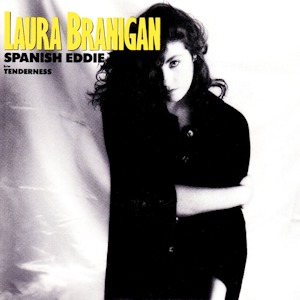
"Spanish Eddie" is a song by American singer Laura Branigan, released as the lead single from her fourth studio album, Hold Me (1985). The song was produced by Jack White and arranged by Harold Faltermeyer. Released in July 1985, the single became Branigan's sixth top-40 entry in the United States in two and a half years, peaking at number 40 on the Billboard Hot 100 and number 37 on the Cash Box singles chart. It also peaked at number 29 on the Billboard's Adult Contemporary chart, while a 12″ dance version reached number 26 on the Hot Dance Club Play chart.
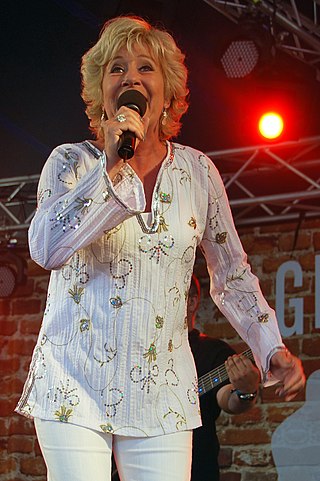
Birthe Kjær is a Danish singer. She finished second at the Dansk Melodi Grand Prix in 1980, 1986 and 1987, before winning in 1989, and went on to finish third at the 1989 Eurovision Song Contest in Lausanne. She also finished third at the Dansk Melodi Grand Prix in 1991.

The singles discography of American country artist Dottie West contains 59 singles released as a solo artist, 12 singles released as a collaborative artist, 3 promotional singles and 1 other charting song. West signed with RCA Victor Records in 1963, having her first Top 40 hit the same year. It was followed in 1964 by "Love Is No Excuse", a duet with Jim Reeves that became West's first top 10 hit. In 1964, she also released "Here Comes My Baby". The song reached number 10 on the Billboard Hot Country Singles chart and became the first song by a female country artist to win a Grammy award. From her 1966 album, West issued four singles, including the top 10 hits "Would You Hold It Against Me" and "What's Come Over My Baby". Over the next two years she had major hits with "Paper Mansions", "Like a Fool", "Country Girl", and "Reno". In 1969, West collaborated with Don Gibson on "Rings of Gold", which reached number 2 on the Billboard country chart. In 1973, she released a single version of a commercial jingle originally used by The Coca-Cola Company. Entitled "Country Sunshine", the song became West's biggest hit, reaching number 2 on the country songs chart and number 49 on the Billboard Hot 100. The song also nominated her for her eleventh Grammy. After releasing the top 10 hit "Last Time I Saw Him" (1974), West's chart hits declined and she was dropped from RCA in 1976.

The Wind Kissed Pictures is an EP by American deathrock band Christian Death, and is the debut release featuring Valor Kand on vocals. It was released in 1985 through Nostradamus Records and has spawned one single, "Believers of the Unpure". On the album, the band's title is made longer, calling themselves For Sin and Sacrifice Must We Die a Christian Death. Allmusic gave the album two stars out of five. However, they claimed it to be "some of the finest post-Rozz Williams work Christian Death would produce."
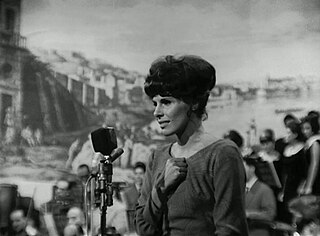
The Festival della Canzone Napoletana, commonly known as the Festival di Napoli, is a Neapolitan song contest. The first edition was held in 1952 and the last in 2004. From 1952 to 1970 the show was broadcast on RAI and from 1998 to 2004, in a differently spirited version, by Rete 4.
"Blue River" is a 1965 song by Elvis Presley. He released it on a single in December 1965 or January 1966.

"Petite fille" is a song by French singer Johnny Hallyday. It was released in August 1967 on an EP and also appeared on Hallyday's that year's album Johnny 67.
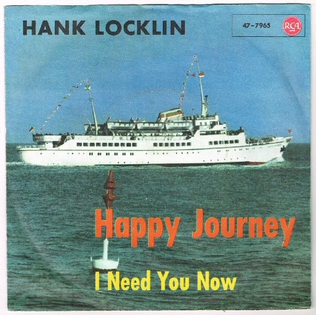
"Happy Journey" is a song written by Charles Nowa, Fred Jacobson and Nicola Wilke. It was originally recorded by American country singer–songwriter Hank Locklin. In 1961, it was released as a single and became a major hit on the American country chart that year. It would later be released on Locklin's studio album of the same name.
References
- 1 2 "Luciano Virgili - Giamaica (Vinyl) at Discogs". Discogs . Retrieved 2017-11-07.
- 1 2 "Giorgio Consolini - Giamaica (Vinyl) at Discogs". Discogs . Retrieved 2017-11-07.
- 1 2 "Robertino* - Jamaica / Pappagallo at Discogs". Discogs . Retrieved 2017-11-07.
- ↑ "spanishcharts.com - Robertino - Jamaica" . Retrieved 2017-11-07.
- 1 2 "Robertino* - Jamaica at Discogs". Discogs . Retrieved 2017-11-06.
- ↑ "Как сложилась судьба Робертино Лоретти - мальчика с голосом ангела". Rossiyskaya gazeta . 2014-07-27. Retrieved 2017-11-07.
- ↑ "Робертино Лоретти исполнил O Sole Mio и Jamaika во Владивостоке (ФОТО; ВИДЕО)". Новости Владивостока на VL.ru. 2016-06-01. Archived from the original on 2021-12-28. Retrieved 2017-11-07.
- ↑ "Робертино Лоретти: Я был машиной для зарабатывания денег". Komsomolskaya pravda . 2003-04-23. Retrieved 2017-11-07.
- ↑ Сергей Сычёв (5 September 2017). Радиола. ЛитРес. pp. 48–. ISBN 978-5-04-051034-4.
- ↑ Муслим Магомаев (11 October 2017). Живут во мне воспоминания. ПРОЗАиК. pp. 106–. ISBN 978-5-04-074750-4.
- ↑ "Главная тайна Робертино Лоретти: куда на самом деле пропал музыкальный вундеркинд". 2016-10-16. Retrieved 2017-11-07.
- ↑ "Робертино Лоретти". Radio Freedom. 2003-04-29. Retrieved 2017-11-07.
- ↑ "45cat - Birthe Wilke - Pepito / Jamaica - Philips - Denmark - 355 247 PF" . Retrieved 2017-11-07.
- 1 2 "Birthe Wilke - Pepito / Jamaica (Vinyl) at Discogs". Discogs . Retrieved 2017-11-07.